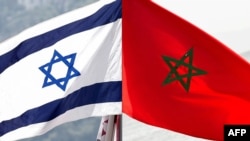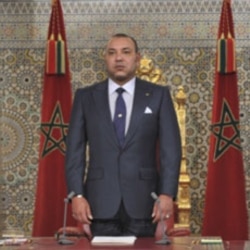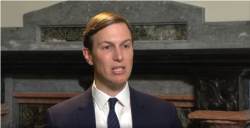In a U.S.-brokered deal, Israel and Morocco have agreed to recognize each other.
This follows three other Arab countries — Bahrain, Sudan and the United Arab Emirates — recently establishing ties with the Jewish state, which several times since its modern founding in the late 1940s has found itself at war with its Muslim-majority neighbors.
U.S. President Donald Trump on Thursday announced the deal between Morocco and Israel on Twitter, hailing it as a historic and massive breakthrough for peace in the Middle East and a continuation of his regional diplomacy known as the Abraham Accords.
Israeli Prime Minister Benjamin Netanyahu, welcoming the Jewish festival of Hanukkah, called the establishment of ties with the North African kingdom "another great light of peace.” He said it would lead to direct flights between the countries and the opening of diplomatic missions.
Moroccan King Mohammed, speaking to Trump on Thursday by phone, confirmed the plans for direct flights for Israeli tourists to and from Morocco.
As part of the agreement, the United States agreed to recognize Moroccan sovereignty over the entire Western Sahara, a former Spanish territory where international negotiators have failed to resolve a long-running dispute.
Morocco’s royal court said Washington would open a consulate in the Western Sahara as part of the agreement.
Morocco has claimed the territory as its “southern provinces” in opposition to the Polisario Front, based in Southern Algeria, which has been fighting for independence for Western Sahara.
"This will not change an inch of the reality of the conflict and the right of the people of Western Sahara to self-determination," said the Polisario's Europe representative, Oubi Bchraya, who vowed the movement would continue its struggle.
A surprise
Thursday’s announcement from Washington about Western Sahara caught diplomats by surprise.
U.N. spokesman Stephen Dujarric told reporters the world body learned of the news in Trump’s tweet at the same time everyone else heard of it. Regarding the sovereignty issue, he said the U.N. secretary-general's position remained unchanged: It needs to be resolved in accordance with Security Council resolutions.
Asked about his message to those in Western Sahara, the U.N. spokesman replied that it was “to avoid any action that could make the tense situation worse.”
Jared Kushner, Trump's senior adviser and son-in-law, did not directly answer a question from VOA about whether diplomats for the United Nations and other entities were consulted about U.S. recognition of Moroccan sovereignty over the territory.
“It's recognizing the inevitability of what is going to occur, but it also can possibly break the logjam, to help advance the issues in the Western Sahara,” Kushner said during a Thursday conference call with White House reporters. He added the United States wanted the “Polisario people to have a better opportunity to live a better life” and Trump “felt like this conflict was holding them back as opposed to bring it forward.”
Trump administration officials predicted more countries would normalize ties with Israel.
"The fruits of these efforts have been become very apparent,” Kushner told reporters on the conference call. “But we also believe that there is a lot more fruits to come in the short, medium and long term.”
Kushner specifically mentioned Saudi Arabia as one country that will inevitably establish relations with Israel.
That may not occur until Trump leaves office on January 20. He lost his re-election bid last month to former Vice President Joe Biden.
“Over four years, he hasn't started wars. He's ended wars,” Kushner said of Trump. “He showed strength. I mean, he's struck when needed. He's enforced his red lines. He’s liked, he's respected, and he's feared, which is critical in the Middle East and in those areas toward making progress.”
VOA U.N. Correspondent Margaret Besheer contributed to this report from New York.







